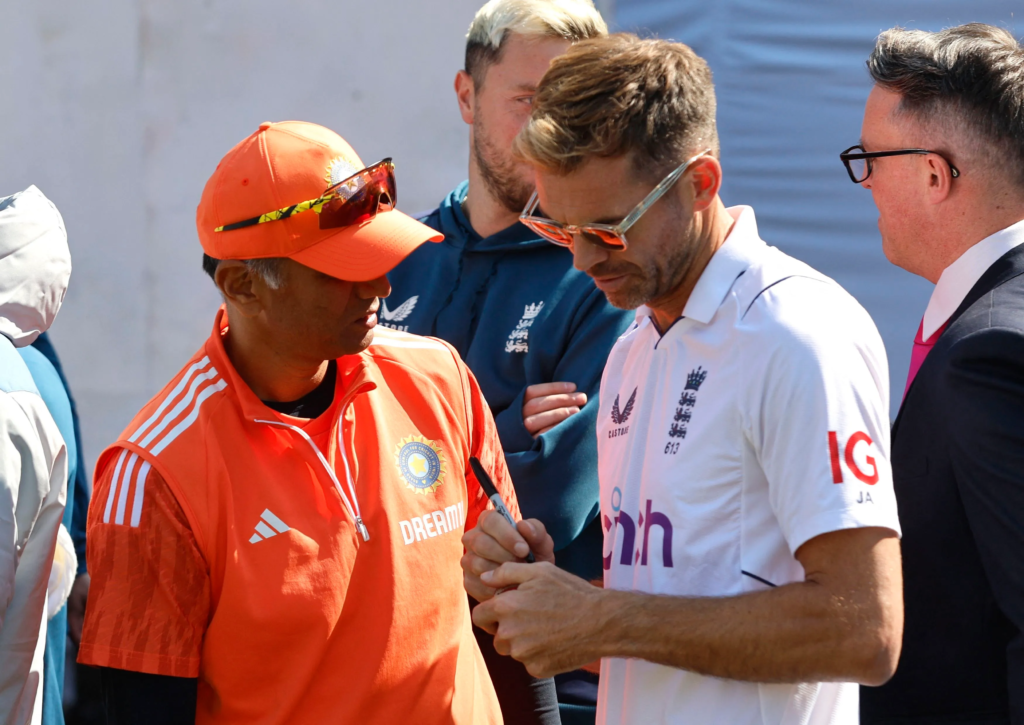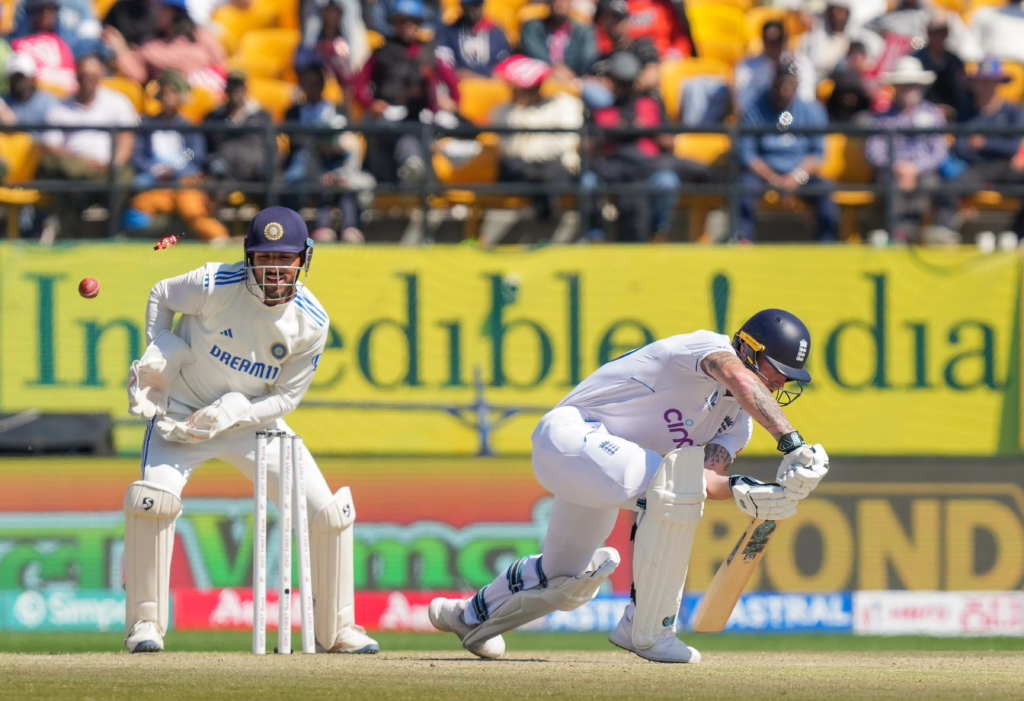Visitors’ lack of robust defensive technique was thoroughly exposed, and their bowling lacked bite as well.
It’s a break Bazball would have craved for. The most repeated word in cricket over the last two years, even inked in the dictionary, would slip into the edge of memory for the next four months, as white-ball cricket would take over; Brendon McCullum, Ben Stokes, and their Bazballers would now reunite only in July.
“Nothing would change (during the break),” Stokes would insist. Or would they? It was the question, framed and phrased differently, posed repeatedly at Stokes after the defeat in Dharamsala. The England captain was defiant and idealistic, producing an album of quotations wherein he sounded Buddha, Bollywood bad boy and management guru rolled into one. Sample this: “Failure is a great teacher to sports teams. You either let failure and disappointment eat you up and shoot you down, and you never seem to find a way back up.” Or taking the series, “as a fuel to perform.” Or the warning filed without an evil smirk: “Write this team off, write me off, at your own peril.”
Whether Baz and Stokes would dilute the bravado approach is indefinite, but the defeat in India should offer them lessons that their approach needs refinement, layers and gears, and that it has jarring imperfections. It held a mirror to their flaws and cracks. At times, they lived in a floating world of delusions. Unabashed aggression can be exciting, it could win you games, it could dishevel adversaries, it could panic and confuse them. It gloriously paid off in Hyderabad – the win, irrespective of the outcome of the series, would be one of their finest victories.
#BazBowled & how! 💥
Team India seals the series 4️⃣-1️⃣ with an emphatic win by an innings & 64 runs at Dharamsala. 🙌#IDFCFirstBankTestSeries #INDvENG #JioCinemaSports pic.twitter.com/uf59sQApE8
— JioCinema (@JioCinema) March 9, 2024
But it’s when they began to self-gloat, when they began to underestimate the skill and depth of India’s bowlers, the wiles of their spin-trio, the lethality of Jasprit Bumrah and the shortcomings of their own methods, that things began to go pear-shaped.
In the end, it was the triumph of a vastly superior bowling team. It’s often the case — bowlers are destiny’s men in Tests.
Rahul Dravid, the India coach, would reassert this: “Their experience was in the batting and they had the ascendancy with bat in hand at that point of time and we needed to respond. Our experience was in bowling and we won those contests.”

Cricket – Fifth Test – India v England – Himachal Pradesh Cricket Association Stadium, Dharamshala, India – March 9, 2024 England’s James Anderson signs his autograph on a ball for India coach Rahul Dravid after the match. (REUTERS/Adnan Abidi)
Against as multi-skilled a bowling firm as this, England’s batsmen required more dimensions to their game than wantonly attacking them. These are battle-hardened bowlers with nearly 1,000 wickets among them, masters of their conditions. They couldn’t be repeatedly disrupted by batsmen constantly charging towards them or frequently reverse-sweeping. The confusion they wreak, if at all, would be temporary.
But Stokes staunchly defended their stroke-making, using the example of Ben Duckett. “He ran down the wicket and tried to push pressure back on Ashwin. I said to Ducky after, ‘think how annoyed you would be to get out to Ashwin just propping forward,’” he said.
“It’s knowing that sometimes taking risks brings your downfall, but when there’s a reason behind taking these risks that don’t quite work out, that is fine,” he added. One of their key principles is not to criticise a teammate in public.
No Plan B
But embracing risks to gloss over a weak defensive game, as has been the case with Duckett and Ollie Pope, is cause for concern. Zak Crawley has a sounder technique, but he seemed to be obsessed with the idea of being a martyr for Bazball. Every overseas batsman who has prospered in India possessed a robust defensive technique against spinners. Kevin Pietersen had, Alastair Cook, Andrew Strauss and Ian Bell had too. They could have taken a lesson from Joe Root, who shunned Bazballing after the reverse-scoop intemperance in Rajkot and scored a classical hundred in Ranchi. The lost-cause knock in the second innings in Dharamsala too was scored in a similar way. But his reawakening came too late.

Ben Stokes was castled by R. Ashwin in the second innings of the Dharamsala Test.
The less fiery audience could wonder how England would have benefitted from someone with the doggedness of Cook or Strauss. The England of 2012 struck the perfect balance, a heady blend of Cook’s obduracy and Pietersen’s enterprise. As history would teach them, an age of extremes is transient. At some point, a synthesis is arrived upon. Bazball, in its current avatar, could win you a sprint, but not a marathon. Test series in India requires the endurance of a marathoner.
For England to succeed, they perhaps need to discover a middle path. Not perhaps as their default mode, not necessarily a compromise, but to show the world that they are not inflexible hardliners, that they could hum Madonna as much as they could rattle out Megadeth. But if they are to reclaim the Ashes in Australia or be successful long-term, they need to find the balance as well as discover a few more firebrands. The bowling resources are bereft of depth. Apart from Mark Wood, they are deficient in pace. Jofra Archer seems a lost dream; Ollie Robinson is more Paul Collingwood these days; the spinners are still raw; James Anderson is in the autumn of his career. Their aggression has not matched that of their batsmen.
Nonetheless, they have the capacity to thrill. No team has tested India at home in the last six years as the Bazballers. Apart from the Dharamsala Test, ascendancy exchanged hands in almost every session. In the end, India grabbed the decisive moments and hours, the tactics of the hosts were less extreme, their tunes had different tenors, and they were not blinded or bound by a specific playing style, imprisoned in their own golden cage.
Now England have to come out of it and breathe some fresh air. Bazball would return, but how it returns, whether it is a bolder or toned-down version, would determine its longevity and ultimate success. The break could not have come sooner, for both the concept and the word itself.

Source:indianexpress.com

